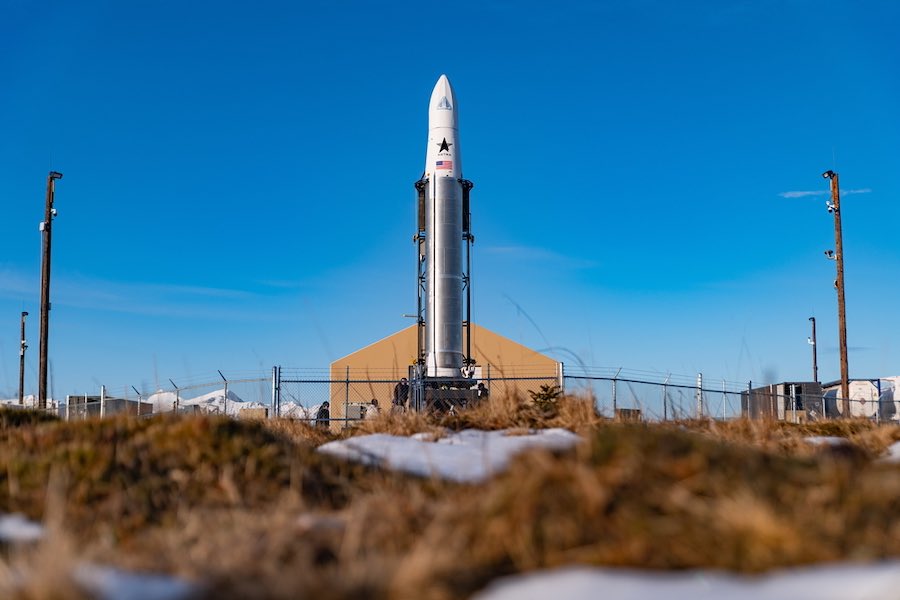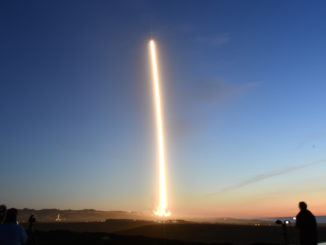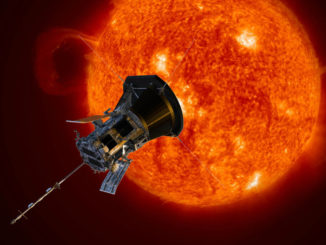
A small satellite launcher built by Astra “experienced an anomaly” Monday on a launch pad at Kodiak Island, Alaska, forcing the cancellation of a planned orbital launch attempt this week, according to the company’s co-founder and CEO.
The incident at the Pacific Spaceport Complex on Kodiak Island occurred during a pre-launch countdown dress rehearsal, and was first reported by KMXT, a local public radio station.
“I can confirm that the vehicle experienced an anomaly after an otherwise very successful day of testing in preparation for the launch,” said Chris Kemp, Astra’s co-founder and CEO, in an emailed statement late Monday.
Officials from Astra and the Pacific Spaceport Complex, which is run by the Alaska Aerospace Corp., said no one was injured during the mishap. Astra’s rocket was damaged, although the extent of the damage was unclear.
“Fortunately, our hardware was the only thing harmed, and the team is already working hard to understand the root cause so we can improve the design,” Kemp said.
Astra was planning a launch attempt was soon as Tuesday to place a small payload into low Earth orbit. Astra’s first orbital launcher, named Rocket 3 or Rocket 3.0, is designed to carry up to 55 pounds (25 kilograms) of payload into a sun-synchronous polar orbit.
Those plans were canceled after Monday’s anomaly, Kemp said.
“Unfortunately, we will not be attempting a launch this week,” he said. “We intend to wait until conditions with coronavirus improve before making another attempt.”
“I can confirm we had an anomaly on the launch pad,” said Mark Lester, CEO of Alaska Aerospace Corp., an agency of the state of Alaska. “We are executing our emergency checklist. We request everyone stay clear of the area to allow our crew to address the situation,” he told KMXT.
Astra’s rocket was originally supposed to launch in February as part of a prize competition managed by the Defense Advanced Research Projects Agency, or DARPA, a U.S. military research and development office.
DARPA’s Launch Challenge offered up to $12 million prize money to a company that demonstrated its ability to launch a small payload to low Earth orbit on short notice, then perform the same feat from a different launch pad less than a month later.
The deadline for the first of two Astra missions under DARPA’s Launch Challenge was March 2. After several weather delays and other schedule slips in previous days, Astra scrubbed a launch attempt March 2 due to suspect data detected from the rocket’s guidance, navigation and control system.
Three CubeSats for the U.S. Department of Defense and the University of South Florida, along with a space-based beacon designed to aid in space traffic management, were slated to ride Astra’s rocket into orbit through DARPA’s Launch Challenge.
On March 2, DARPA and Astra officials said the Prometheus CubeSat, the University of South Florida’s two Articulated Reconnaissance and Communications Expedition, or ARCE, nano satellites, and the space-based radio beacon payload were to be removed from the rocket after the end of the Launch Challenge.
Jared Adams, a DARPA spokesperson, said those payloads were safely removed from the rocket before Monday’s anomaly.
Kemp confirmed no payloads were on-board Astra’s rocket at the time of the incident Monday.
Astra says its rockets can launch with a small crew, requiring just days to set up a portable launch pad. The rocket itself, which measures 38 feet (11.6 meters) long, can fit into a standard shipping container and be towed by truck.
The rocket is powered by five kerosene-fueled on its first stage, and a single kerosene-fed engine on its second stage.
Astra designated the rocket “1 of 3.”
“This was our first test launch of Rocket 3, and we called it 1 of 3 because we believed that it would probably take three launches before we could successfully deliver a satellite into Earth orbit, so we knew that this was a long shot going into it, but understood how strategically important responsive launch was to the government,” Kemp said in a March 2 teleconference with reporters.
Headquartered in Alameda, California, Astra was established in 2016 and operated in stealth mode until early February, when Bloomberg published an exclusive story about the company’s progress and plans.
Astra is one of many companies vying for a place in the commercial small satellite launch market. It’s just the second company of the group to get an orbital-class rocket to a launch pad, following Rocket Lab’s debut in 2018.
Email the author.
Follow Stephen Clark on Twitter: @StephenClark1.



